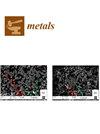回收活化能的新方法:铜氧化的应用
IF 2.5
3区 材料科学
Q3 MATERIALS SCIENCE, MULTIDISCIPLINARY
引用次数: 0
摘要
计算活化能有助于理解和确定氧化的基本现象。我们提出了一种新方法,无需对氧化定律进行任何先验假设,就能获取连续退火的部分和完全氧化样品的活化能。该方法可处理退火过程开始和结束时金属和氧化物厚度测量的不确定性。退火过程中可能出现的氧化规律变化也包含在模型中。通过使用经过调整的粒子群优化方法来解决逆问题,我们还计算了最后一次退火过程中的最终氧化时间。我们将该方法应用于三个初始铜层为纳米级的样品在常压和露天条件下的连续退火。从实验数据中得出了一个、两个和三个连续规律。我们发现氧化开始时的活化能值约为 105-108 kJ mol-1,第二步为 76-87 kJ mol-1,第三步为 47-59 kJ mol-1。我们还表明,铜和氧化物厚度的时间演化也可以通过其不确定性得到。本文章由计算机程序翻译,如有差异,请以英文原文为准。
New Method to Recover Activation Energy: Application to Copper Oxidation
The calculation of the activation energy helps to understand and to identify the underlying phenomenon of oxidation. We propose a new method without any a priori hypothesis on the oxidation law, to retrieve the activation energy of partially and totally oxidized samples subject to successive annealing. The method handles the uncertainties on the measurement of metal and oxide thicknesses, at the beginning and at the end of the annealing process. The possible change in oxidation law during annealing is included in the model. By using an adapted Particle Swarm Optimization method to solve the inverse problem, we also calculate the time of final oxidation during the last annealing. We apply the method to successive annealings of three samples with initial nanometric layers of copper, at ambient pressure, in the open air. One, two and three successive laws are recovered from experimental data. We found activation energy values about 105–108 kJ mol−1 at the beginning of the oxidation, 76–87 kJ mol−1 at the second step, and finally 47–59 kJ mol−1 in a third step. We also show that the time evolution of copper and oxide thicknesses can also be retrieved with their uncertainties.
求助全文
通过发布文献求助,成功后即可免费获取论文全文。
去求助
来源期刊

Metals
MATERIALS SCIENCE, MULTIDISCIPLINARY-METALLURGY & METALLURGICAL ENGINEERING
CiteScore
4.90
自引率
13.80%
发文量
1832
审稿时长
1.5 months
期刊介绍:
Metals (ISSN 2075-4701) is an open access journal of related scientific research and technology development. It publishes reviews, regular research papers (articles) and short communications. Our aim is to encourage scientists to publish their experimental and theoretical results in as much detail as possible. Therefore, there is no restriction on the length of the papers. The full experimental details must be provided so that the results can be reproduced. Metals provides a forum for publishing papers which advance the in-depth understanding of the relationship between the structure, the properties or the functions of all kinds of metals.
 求助内容:
求助内容: 应助结果提醒方式:
应助结果提醒方式:


